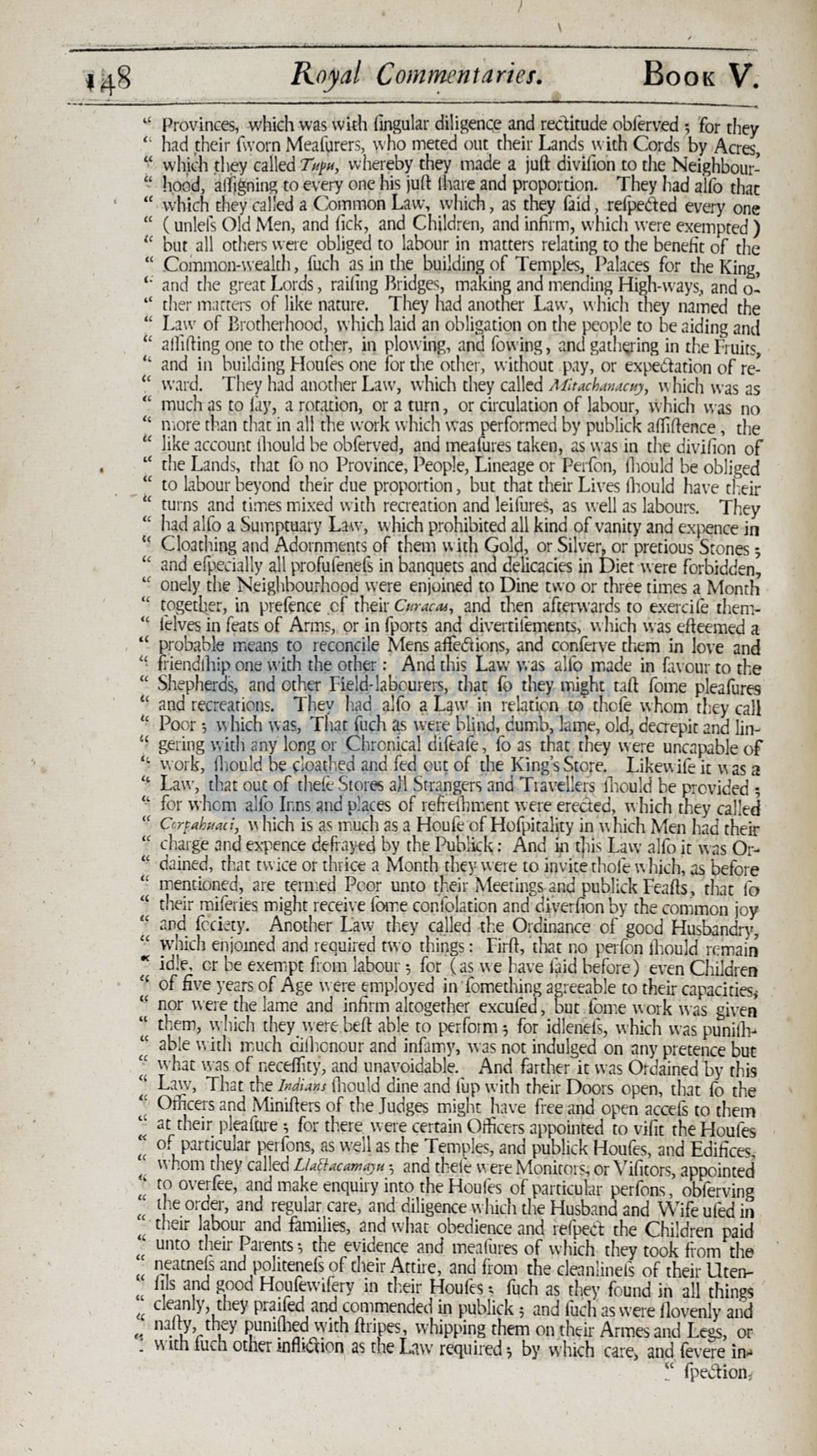

Royal
Commentariu.
BooK
v~
~, ProvlnE€S; whiGh.wa.s ,.vieh Gngular diHgeri~ anC!l rec1itude obferv~d;
Tor
chey
.~' had their fworn Meafµrers, ~/lo meced out chei~ Lan~s, w~th Cor~s
by
Acres,
'.' whid1 they (alled
Tupu,
wher~by chey made a ¡ufr dw1íion to che Ne1ghbour–
'-' h,oe,cii,
'aíl¡gAin17 to every
GRe
his juíl: fil1ai:e and proporti9n. They had alfo thac
" which they calied a Common La-w, wh1ch, as they fa1d, .refpeéted every one
ce
(
unlers Old Men, and íick, and Children, and infirm, which were exempted)
'' but ali ochers were obliged to labour in matters relating to the benefit of che
ce
.Coírnnon-wealch, fuch as in che building of Temples, Palaces for che King,
e:
and che greac Lords, raiíing Bridges, making and mending High-ways_, and o~
'' cher matters of like nacure. They had another Law, which chey named che
'.' Law of Brncherhood, which laid an obligacion on che p~ople ro be aiding and
" aílifting one ro che orher, in plowing, ano íowing, and garhering in che Fruics,
'' and in building Houfes one for the orher, wichouc pay, or expeétacion of re–
'.' ward. They had anorher Law, which they called
Mitachanacuy,
which was as
" muchas to
fay,
a roraúon, ora turn, or circulation of labour, which was no
'' rnore chan chac in ali che work which was performed by publick aílifteflce, che
t,
like account fhould be obferved, and meafures caken, as was in rhe divifion of
" rhe Lands, chac fo no Province, People, Lineage or Perfon, fhould be obliged
'' to
labour beyond cheir due proportion, bue chat cheir Lives lliould have cheir
-
te
turns and times mixed wich recreation and leiíures, as well as labours. They
" had alfo a Surnprnary
La,1,,
which prohibited ali kind of vanicy and expence
in
" Cloathing and Adornm€11cs of thern ,\·~~h Gol5l,
or
~ilv~r or prerious Stones;
" and eíµ.ecially a,ll profuíene(s in banquets ~nd c1elic,1cies in Diet were forbidden,
«
onely cb€ lNeighbourhop¡:l were enjoined
to
Dine cwo or chree times a Momh
'' togetl¡er, in pre[(:nce .cf th~ir
Curaca.,
and t11en af~erwards
to
exercife rhem–
" felv~ in feats of Arms, 9r in fporcs and diverciíe¡:nen~, which was efteemed a
'' probélble mean.s to reconcjle Me115 affefüo11s, and conferve chem
in
love ancl
1
1
friendíhip one with che othyr : And chis Law was alío made in favour to the
" Shepherds, and ocher Field- labourers,
th?q
fo
they ~11iihc raíl: fome pleafures
1
'
and recreations. They hacj ~]fo
?
Lªw in reh¡t~ n
~
chofe whom chey call
" Poor ; wbich was, Thac (uch
~
were 9l~nd, dumb, lame, old, deaepic and lin~
~' gering \Yich any' long or Cbronical difeafe, fo as rbac rhey were uncapable of
'' \\'ork, fhould be ~loach~d and fed ou~ of the King's Sro e. Likewife ic \Yas a
'·' Law, tbac out of rhefe Stores ar! Srra,ngm and Travellers fhould be provided ;
'·' for ·whorn alfo Inns ;ind places of refrefhment were ereá~ó, ,Yhich chey called
ce
Corpahuaci,
which is as muchas a Houfe·of Hofpitalicy in which Men had cheir
" charge :md expence de-frayeg by ch~ Publick: And
ip
tJ1i Law alfo
it
was Or~
" daíned, chaecwíce or chrice a Momh r-hey were co ir¡vice chofe which, as ~efore
" memioned, are cerrned r>oor unto rJ1eir Meecings-~rn;l publick Feafis, chac
fo
" their miferies mighc receive fome coníolacion and d1verfion by rhe common
joy
'.' and_ fccie!Y· Another J:;aw rhey c~Jled ch~ Oi·dinance of good Husbapdry,
ce
wh1ch en¡orned and requ1rnd rwo rh1Qgs:
fll'íl,
rhac no períon fhou]d rr.main
"' idle, cr be exempc from labour ; for (as we have f?id befare) even Children
'' of five years of Age ,Yere employed in fomething agreeable
to
their capacicies;
" nor were che lame and infirm alrogether excufed, bue _ fome work was gi,
en
" them, which chey wert beíl: able
to
perform; for idlenefi, which was punifh•
" ab!e wich rnuch ciifhonour and infarny, was noc indulged on any pretence bue
ce
whac was of neceíliry, and unavoidable. And farrher
ic
was Otdained by rhi3
" Law, Thacthe
Jndians
fhou\d dine and fup wirh their Doors open, tbat
[o
che
" Officers and Miniílers of che Judges mighc have free and open accefs ro rhem
'' at cheir pleafüre; for th~re were certain Officers appoimed ro vifit rhe Houfes–
«
of p:u-cicular perfons, as well as che Temples, and publick Houíes, and Edifices,
" whom they called
Lla
ffacamflJ'lf;
and theíe were Monirors; or Vifitors, appoinced
'' to
overfee, and make
enqui.ryinto che Houíes of particular perfons , obferving
" the order, and regular
care, and diligence which the Husband and Wife ufed
in
::·cheir lab?ur and families, ~nd whac obedience and reípeét rhe Children paid
unto cheir Parenrs; che ev¡de
nce andmeaíures of whICh chey took from th~
" neatnefs and poli.reneB of their
Atti.re, and from the cleanlineís of cheir Uten–
tc
íils and good Houfewiíery in
their Houfes ; fuch as rl1ey found in ali chings
" cleanly, chey praiíed and commended
ÍJ1
pubJick; and
fucl1
as were ílovenly and
::
n~íl:y, they p_uni~e9 ":'le!} firipes, whippi~g rhem on_cheir Armes and legs,
01:
. w1th fuch
ocher mfüéhon as rhe Law required
1
by
which care, and fevere
in,.
~' fpefüon1














